Turkey’s Military Operations in Northeast Syria: A Path to Destruction and Civilian Casualties.
TOP HEADLINES:
- Iran’s Military Operation in Erbil: A Show of Force Masking Fear and Culminating in Human Tragedy.
- Turkey’s Military Operations in Northeast Syria: A Path to Destruction and Civilian Casualties.
- Escalation in the Red Sea and Its Implications on Maritime Security and Global Economic Stability.
- Israel Concludes Intense Military Phase, Hamas Launch Major Rocket Attack.
- Saudi Arabia’s Leap into the Future: The Prince Mohammed bin Salman Stadium Ushers in an Era of Joy and Progress.
=======================
★ IRAQ
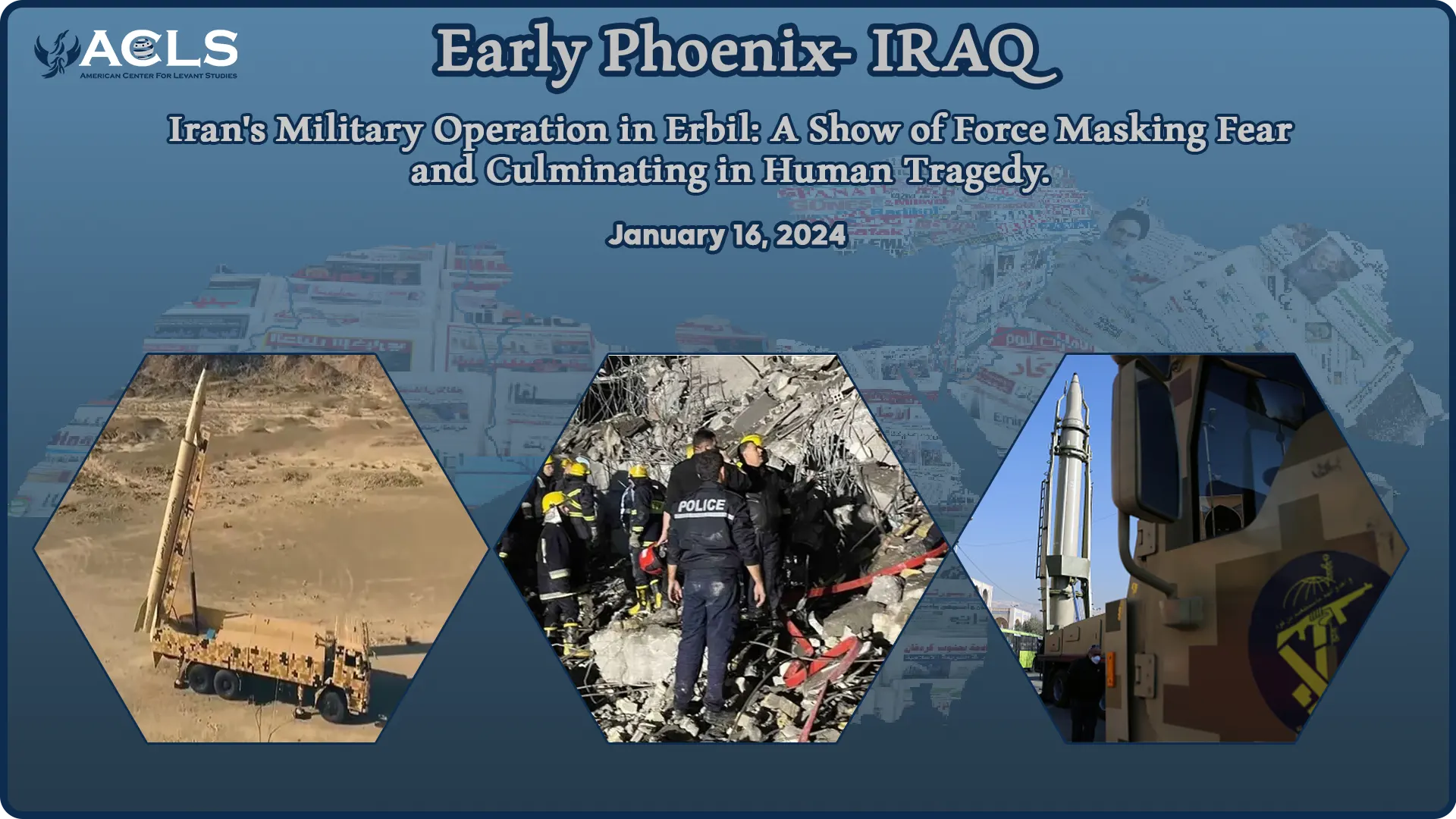
1. Iran’s Military Operation in Erbil: A Show of Force Masking Fear and Culminating in Human Tragedy.
Iran’s deployment of its longest-range “Khaibar Shekan” missiles, capable of reaching approximately 1200 kilometers, along with the use of drones, was more a display of strength amid escalating regional tensions, as reported by Arab media outlets. These attacks briefly halted air traffic movement. The Kurdistan Region’s Counter-Terrorism Unit in Iraq thwarted an attempted drone attack on Erbil International Airport, involving three explosive-laden drones.
A spokesperson for the Iranian ministry claimed Iran’s commitment to regional peace and state sovereignty, yet emphasized its right to defend national security and punish perpetrators. The Iranian Revolutionary Guard Corps (IRGC) acknowledged responsibility for the attacks, justifying them as retaliation for previous assaults in Iran and the assassination of resistance leaders in Syria and Lebanon. Mohammad Saleh Sadeghian, director of the Arab Center for Iranian Studies in Tehran, explained in an interview with Al-Hadath Arab channel that the targeted house of a Kurdish Iraqi trader was based on intelligence linking it to the deaths of Mossawi in Syria and Al-Aarouri in Lebanon. The IRGC also claimed its attack targeted Israeli Mossad spy centers in response to Israeli actions and the killing of resistance leaders.
The Iraqi Foreign Ministry summoned the Iranian chargé d’affaires in Baghdad, condemning the Iranian attacks on Kurdistan and announcing legal actions, including a complaint to the UN Security Council. The Kurdistan Regional Security Council strongly denounced Iran’s attack on Erbil, describing it as a violation of the security agreement between Baghdad and Tehran. The Iraqi National Security Advisor refuted Iran’s claims of targeting a Mossad headquarters, asserting the attack was on a businessman’s home. An Iranian man was arrested in Erbil for espionage and handed over to security authorities. The Iranian missile strike on Erbil resulted in 10 casualties, including a one-year-old girl. Yashro Dzei and his family were among those killed.
=======================
★ YEMEN
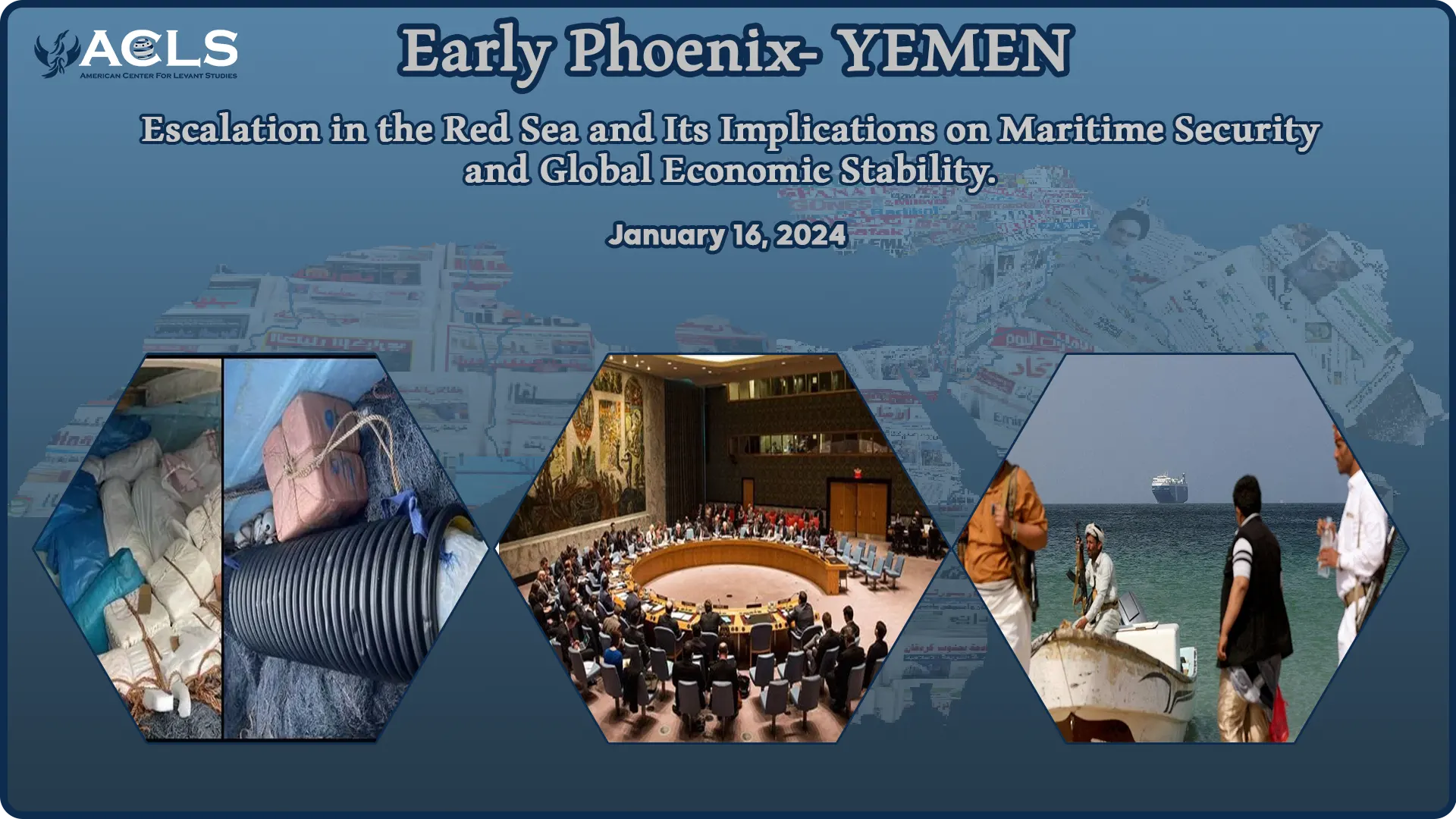
2. Escalation in the Red Sea and Its Implications on Maritime Security and Global Economic Stability.
The ongoing Houthi attacks on commercial vessels in the Red Sea are escalating concerns about maritime security and its impact on global economic stability. These attacks, involving anti-ship ballistic missiles, have led to the suspension of operations by 19 shipping companies through the Suez Canal and forced the Japanese shipping company Nippon Yusen to halt its Red Sea operations. In a significant development, the U.S. military command announced that on January 11, 2024, it intercepted advanced Iranian weapons bound for the Houthis. The seizure was executed by U.S. Central Command (USCENTCOM) naval forces near the Somali coast in the Arabian Sea’s international waters. The operation, conducted by U.S. Navy SEALs supported by helicopters and unmanned aerial vehicles (UAVs) from USS LEWIS B PULLER (ESB 3), resulted in the capture of components for medium-range ballistic missiles and anti-ship cruise missiles, as well as air defense systems. On January 15, 2024, at 2:00 PM Sanaa time, U.S. forces detected a Houthi-launched anti-ship ballistic missile aimed at the Southern Red Sea shipping lanes. The missile failed and landed in Yemeni territory without causing injuries or damage. At 4:00 PM, the Iran-backed Houthis fired another anti-ship ballistic missile from Yemen, striking the M/V Gibraltar Eagle, a Marshall Islands-flagged container ship operated by the United States. The ship reported no injuries or significant damage and continued its journey. The situation intensified on January 16, 2024. At 4:15 AM Sanaa time, U.S. forces conducted strikes against the Houthis, destroying four anti-ship ballistic missiles ready for launch in Houthi-controlled areas of Yemen. At 1:45 PM, the Houthis launched an anti-ship ballistic missile into international shipping lanes in the Southern Red Sea, hitting the M/V Zografia, a Maltese-flagged bulk carrier. The vessel remained seaworthy and continued its transit through the Red Sea with no reported injuries. These escalating Houthi attacks in maritime chokepoints and the Arabian Sea have led to significant disruptions in international shipping. The ongoing threats have forced vessels, including those transporting liquefied natural gas from Qatar, to take alternative routes such as the Cape of Good Hope. The situation has prompted closed-session discussions at the United Nations Security Council, involving the UN envoy and other officials, focusing on Houthi attacks, military responses in the Red Sea, and potential deterrent measures against Houthi activities in international waters. This series of events underscores the growing challenge to maritime security and the impact on global economic stability, necessitating an effective and coordinated international response to enhance security and peace in the region.
=======================
★ SYRIA
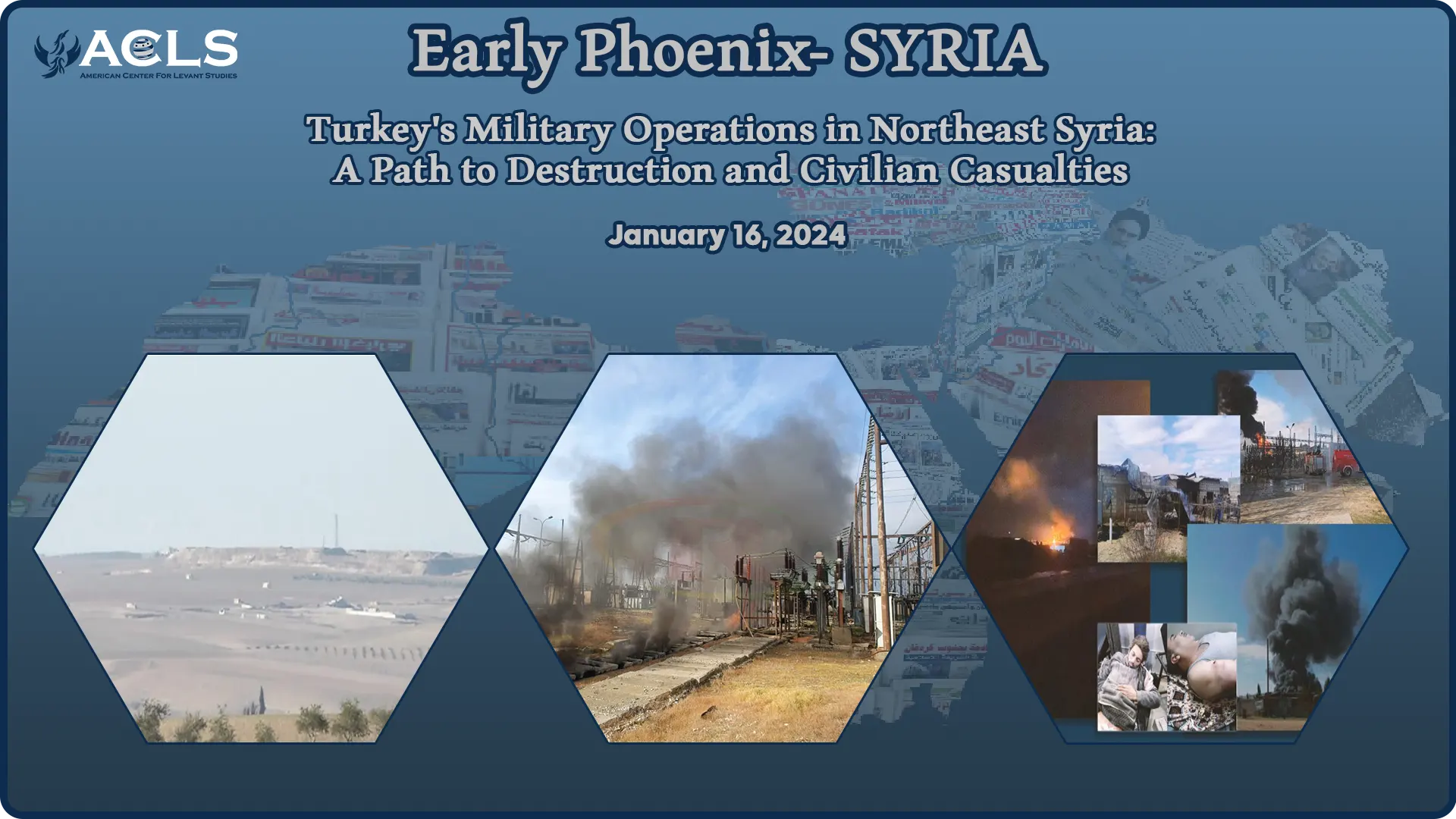
3. Turkey’s Military Operations in Northeast Syria: A Path to Destruction and Civilian Casualties.
The escalation of Turkish military operations in northern and eastern Syria has led to widespread destruction and civilian casualties. Over the past 72 hours, Turkey has launched aerial and ground bombardments on 80 locations in the area, targeting infrastructure and service institutions. The attacks resulted in the injury of 7 civilians, including a woman and two children. Turkish forces bombarded seven villages along the contact line in Manbij, northern Syria, using heavy weaponry and mortar shells. The Manbij Military Council reported renewed bombing on villages in northern and western populated areas. In a rare move, the official news agency affiliated with the Assad government reported on the Turkish attacks. The following report of strikes are from the Syrian Observatory for Human Rights in London:
- A major fire at the Suwaidia Gas Plant in rural Hasakah due to targeting by Turkish drones.
- Disruption of drinking water supply in northern Hasakah due to targeting of power stations that supply water wells.
- Bombing of the oil refinery in Qahtaniyah and the Ouda station.
- Direct targeting of the power generation station in Qahtaniyah, leading to its shutdown.
- Targeting of an internal security checkpoint in Khazna and a driving school in Karbawi village, rural Qamishli.
- Ouda oil station and an oil station in Qahtaniyah, and a power station in Qahtaniyah.
- Turkish artillery shelling of Harmala, Kasrat, and Hajj Musa villages.
- Bombing of Sinjar Mill in rural Amuda, resulting in two injuries.
- Bombing of a military intelligence unit in Dhiban village south of Qamishli, killing 3 regime forces.
- Bombing of a private mill in Sinjar village south of Amuda, injuring a child.
- Targeting of civilian homes in several villages in rural Hasakah.
- Bombing of a power transformer station in Qamishli near the Basil statue roundabout.
- Targeting of an electricity company and a car repair workshop in Ain al-Arab city, and dairy farms in Sheikh Joban village.
The continued Turkish attacks in northern and eastern Syria have put Al-Khayrat Mill, the second-largest wheat mill in the region, out of service. Turkish forces deliberately target vital installations and infrastructure, disrupting basic services and threatening to starve the population. The mill, crucial for flour production and bread supply for many families, suffered damages estimated at about 750 million Syrian pounds, and it is expected to cease operations for at least a month for repairs. The Suwaidia station is a vital source of electricity and gas for residents in northern and eastern Syria, and its repeated targeting is considered a war crime and a violation of international law. The cost of repairing the damage from previous attacks is estimated to be millions of dollars.
In a poignant incident, Bervian Mohammed, aged 33, was killed in a Turkish airstrike targeting the Semaf Printing Press in Qamishli. Mohammed, who worked at the press as a warehouse keeper and accountant, was known for her good character and dedication to her job. Despite the daily tensions in the Qamishli area, she was committed to her family’s safety. The attack that claimed her life also resulted in the death of five others and injured many, highlighting the severity of the military escalation in the region.
4. Iran’s Military Operations in Syria: Escalation and Regional Impacts.
Amidst evolving security dynamics in Syria, the Iranian Revolutionary Guard Corps has executed long-range missile strikes on several targets within Syrian territory. According to official Iranian statements, these strikes aimed at ISIS locations were in retaliation to previous attacks. However, other reports indicate that the strikes resulted in casualties at a medical facility in rural Idlib, raising questions about the accuracy of the declared targets. There were also reports of Israel launching missiles towards Syria last night, which the Syrian air defenses reportedly intercepted, as stated by Syrian regime sources. Nevertheless, no confirmation of these reports was found in global, regional, or local media outlets specializing in direct news coverage of bombings in northeastern Syria. The Syrian Observatory for Human Rights initially reported the bombing as Israeli but later corrected the information, indicating the missiles’ origins were unknown. Additionally, some experts suggested the possibility of the missiles being Iranian.
Following these operations, U.S. forces in the region have heightened security measures, including the removal of the American flag from one of the potential target bases. This development signifies escalating tensions between Iran and other military powers active in the region. Complicating the regional military dynamics further, Russia has deployed additional forces in northern Deir Ezzor, impacting the current balances. These Iranian attacks clearly indicate Tehran’s readiness for military escalation, with significant political implications for regional conflict parties. These events also directly affect international relations, especially between Iran and Western countries, including the United States, highlighting the security and political challenges in the Middle East.
Possible Scenarios of Iranian Military Strikes: In a conversation with the AI program Data Analyst regarding potential scenarios for Iranian military operations, the analyst considered the field to be variable and complex, depending on several interrelated factors. The following scenarios were outlined:
- Continuation of Iranian missile strikes: Iran might continue using missile strikes as a means to exert political and military pressure, especially if it feels a direct threat to its interests.
- Escalation of tensions with the United States: Iranian military actions could lead to increased tensions with U.S. forces in the region, raising the likelihood of clashes.
- Fueling local conflicts: Iranian strikes could escalate conflicts in Syria, particularly among different armed factions.
- Israeli response: Israel, concerned about Iranian influence in Syria, might increase its military intervention in response to Iranian activities. Interventions by other international powers: Developments might compel regional and international powers to intervene or adjust their policies in response to new developments. Data Analyst emphasized that these predictions are based on the analysis of current and past conditions and remain open to change with the evolution of events. The situation in the Middle East is characterized by complexity and constant change, and any slight shift in variables can lead to significant transformations in these scenarios.
5-Russian Bombing Targets Idlib, Results in Civilian Casualties.
In a significant development, the city of Ariha in southern Idlib countryside witnessed a rocket attack by Syrian regime forces, resulting in the death of one civilian and injuries to eight others, including two girls and a woman. According to the Syrian Civil Defense (White Helmets), the bombing targeted residential areas and locations near mosques and medical facilities, indicating tactics aimed at civilian infrastructure.
=======================
★ TURKIYE
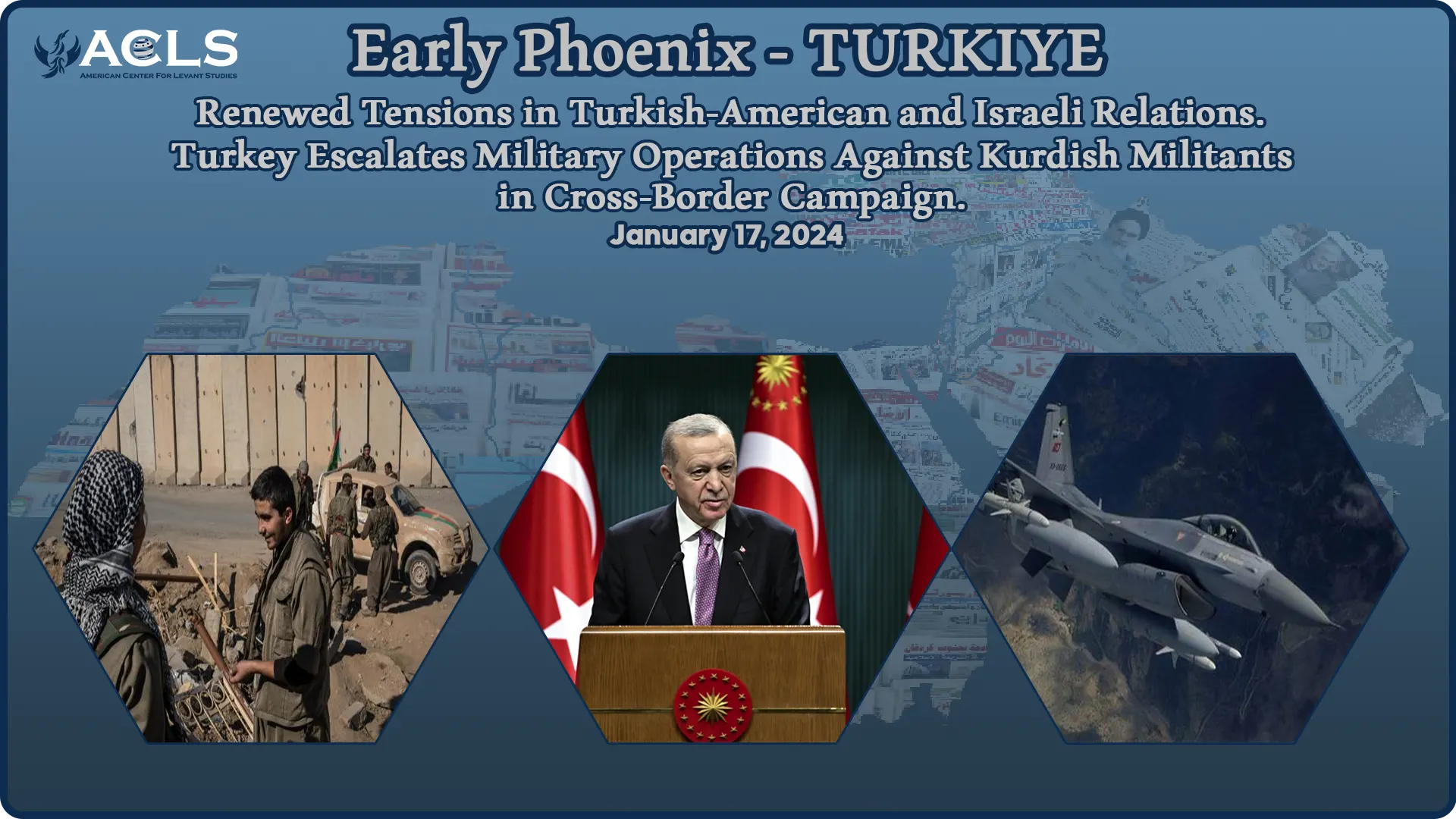
6.Renewed Tensions in Turkish-American and Israeli Relations.
According to a report by Turkey’s “Hürriyet” newspaper, the United States and Israel continue to incite the Kurdistan Workers’ Party (PKK) against Turkey. Turkey, maintaining a firm stance, has declared no change in its military strategy in Northern Iraq, emphasizing the continuation of its operations against both the PKK and ISIS. Sources indicate that under President Recep Tayyip Erdoğan’s leadership, Turkey is shifting towards greater independence from the U.S. and asserting itself as a significant global player. Analysis, including those published in “Foreign Affairs” magazine, highlights Turkey’s growing role in global challenges, particularly in military technology and the defense industry.Turkish unmanned aerial vehicles (UAVs) are playing a pivotal role in this arena, bolstering Turkey’s position as a technological competitor on the world stage. CTech, a Turkish firm specializing in communication technologies and cybersecurity, has received a proposal from NATO for the purchase of its satellite communication products. This offer signifies recognition of Turkey’s technological advancements, especially considering the success of platforms like ANKA-S, TB-2, and ANKA-3 in enhancing Turkey’s defense capabilities. CTech’s CEO, Junaid Farat, points to the strategic importance of developing these systems using local and national resources. The company specifically focuses on communication technologies and information security, with a strong emphasis on cybersecurity in its offerings.
7.Turkey Escalates Military Operations Against Kurdish Militants in Cross-Border Campaign.
Turkish authorities have intensified their military campaign against the Kurdistan Workers’ Party (PKK) and the People’s Protection Units (YPG) in Iraq and Syria, with recent operations targeting 23 sites including shelters and ammunition depots. This five-day air offensive reportedly neutralized 78 militants, among them key leaders. The Turkish government, invoking Article 51 of the United Nations Charter, insists these actions are essential self-defense measures.Domestically, Turkey’s crackdown extends to arresting 165 suspects linked to the PKK across 28 provinces. Particularly notable were the operations in Izmir, where 15 individuals were apprehended, charged with violating anti-terrorism financing laws and engaging in terrorist propaganda. In Istanbul, 20 members of the PKK’s “Women’s Network” were detained, accused of aiding the group’s activities and spreading its message via social media. The Turkish government is also targeting the group’s propaganda efforts in the West, notably accusing British citizen Mark Campbell of promoting the PKK and recruiting young activists. In a broader context, these developments signal Turkey’s unyielding stance against perceived threats to its national security. The Turkish Parliament is actively seeking international support against terrorism, emphasizing the nation’s ongoing battle against “ISIS”, particularly in light of recent attacks within Turkey that have claimed lives. These military and internal security measures underscore Turkey’s commitment to maintaining regional stability and addressing security challenges both along its borders and within its own territory.
=======================
★ ISRAEL & PALESTINIAN TERRITORIES
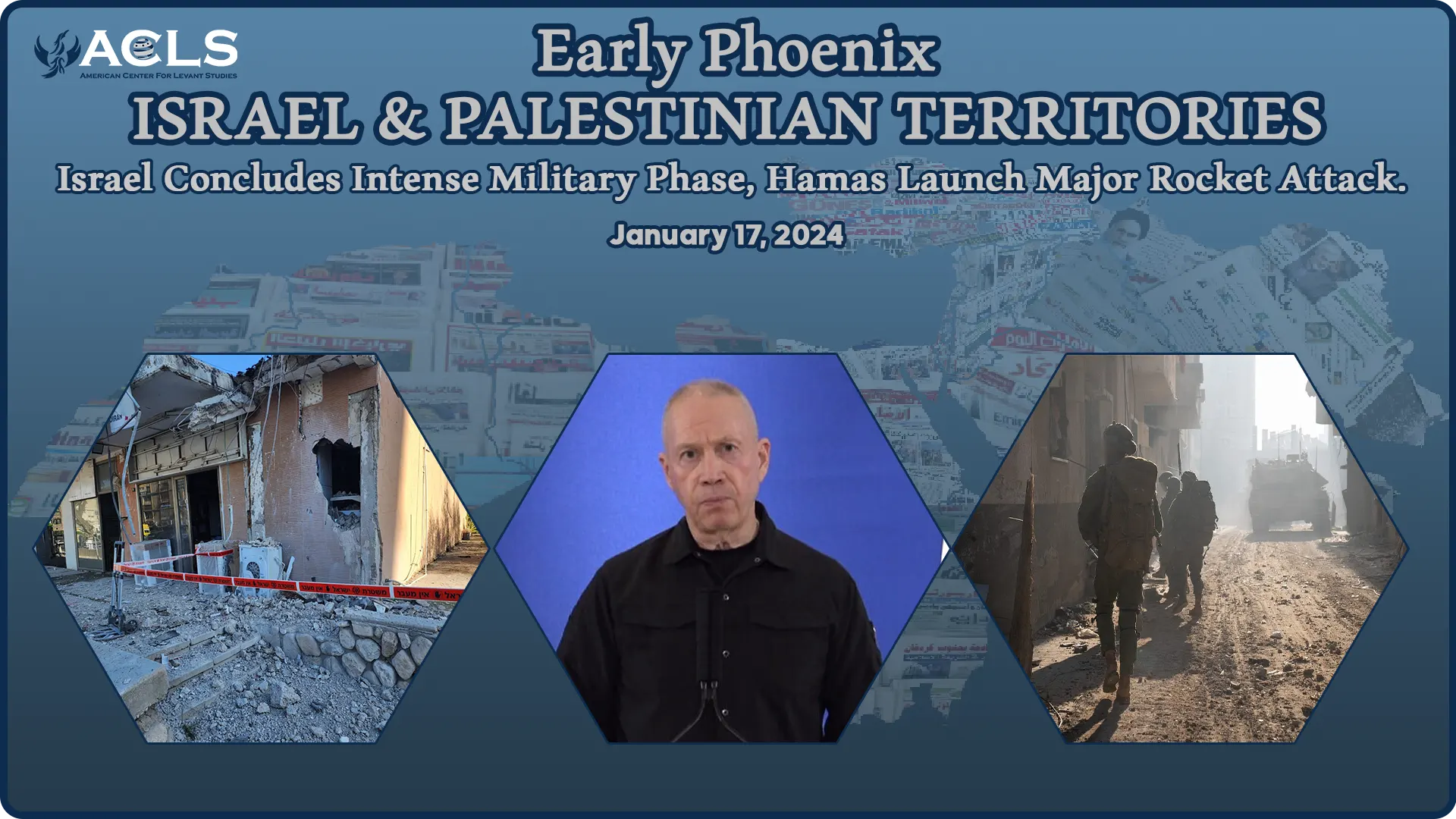
8.Israel Concludes Intense Military Phase, Hamas Launch Major Rocket Attack.
As Israel’s Defense Minister Gantz presented the government with a war plan for the upcoming three months, the intense military operations in northern Gaza have come to a close, and operations in Khan Yunis are nearing their conclusion. The declaration of Hamas’s defeat in northern Gaza has led to a reduction in operations there, but Israeli soldiers continue to identify and destroy remaining Hamas positions. Hamas has reported on Al Jazeera facing Israeli incursions in northern Gaza. On the 103rd day of the conflict, reports highlight fierce battles in Khan Yunis, confirming ongoing clashes and escalating violence. The report draws attention to a surprise for both Americans and Israelis regarding the network of tunnels used by their forces. Al Jazeera’s reports indicate heavy clashes between the resistance and the Israeli army in Khan Yunis, with a focus on preventing the army’s advance towards Nasser Hospital amidst Israeli artillery shelling. Meanwhile, Israeli newspapers have announced the discovery of one hundred missile sites and sixty ready-to-launch missiles in Beit Lahia near the Israeli border. Palestinian groups in Gaza launched over 50 rockets at southern Israel on Tuesday in one of the recent major attacks. These rockets primarily targeted the southern city of Netivot, triggering sirens in the city and surrounding areas. At least one rocket struck the city, resulting in damage to a storefront and other property, with no reports of injuries. These updates provide a comprehensive view of the military tactics and strategies used in the conflict, reflecting the increasing complexity of the situation in Gaza due to ongoing clashes and shelling, and highlighting the escalating tensions in this ongoing conflict. On Wednesday morning, Israel time, Al Jazeera reported that Israeli forces raided the city of Ramallah in the West Bank. This incursion follows a series of Israeli military operations across the West Bank, including in Ras al-Jura, Deir Baha, and Al-Jalda in Hebron, as well as in the Kfar Saba neighborhood and the towns of Azzun and Kafr Thulth in Qalqilya.
=======================
★ LEBANON
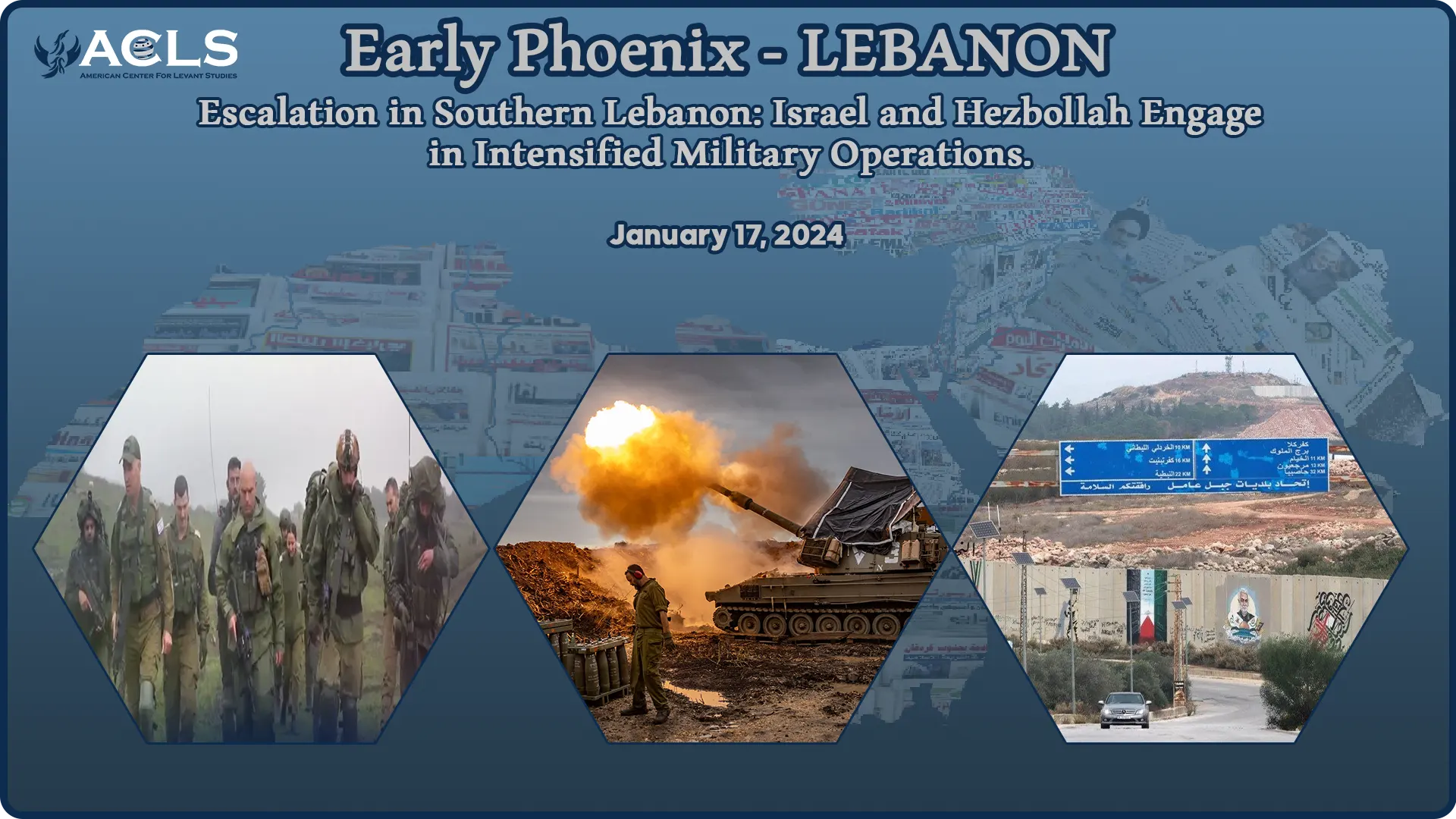
9. Escalation in Southern Lebanon: Israel and Hezbollah Engage in Intensified Military Operations.
The southern region of Lebanon is witnessing a significant escalation in tensions between Israel and Hezbollah. Both parties are actively engaging in reciprocal rocket strikes and noteworthy ground breaches. These incidents have led to rocket launches from Lebanon towards Israel, accompanied by Israeli airstrikes targeting areas in southern Lebanon. The military operations include an operation conducted within Israel and another by Israeli special forces in Lebanon, leading to an escalation in military activities and clashes.
Major General Uri Gordin, commander of the Israel Defense Forces’ Northern Command, has asserted that the Israeli military is more prepared than ever to address any potential escalation of violence along the Lebanese border. He emphasized the ongoing efforts to bolster military readiness and future assessments.
AlHadath channel on YouTube featured a video titled “The Israeli Army Conducts Maneuver Simulating an Attack on Lebanon,” detailing an Israeli military drill that simulated an attack on Lebanon. The exercise involved deploying tens of thousands of soldiers along the northern border. Unfortunately, the video’s translation has been disabled by the publisher, preventing a detailed summary of its content.
The Israel Defense Forces (IDF) have announced an expansion of their operations against Hezbollah in southern Lebanon. These operations include a variety of military actions, such as aerial and artillery attacks. They also encompass special missions inside Lebanon aimed at eliminating terrorist threats in the Eita al-Shaab region. In a continuing escalation, Israeli aircraft attacked Hezbollah’s anti-tank missile systems. This escalation follows Hezbollah’s attack on a significant Israeli air defense site and the headquarters of the Israeli military’s Northern Command.
=======================
★ IRAN
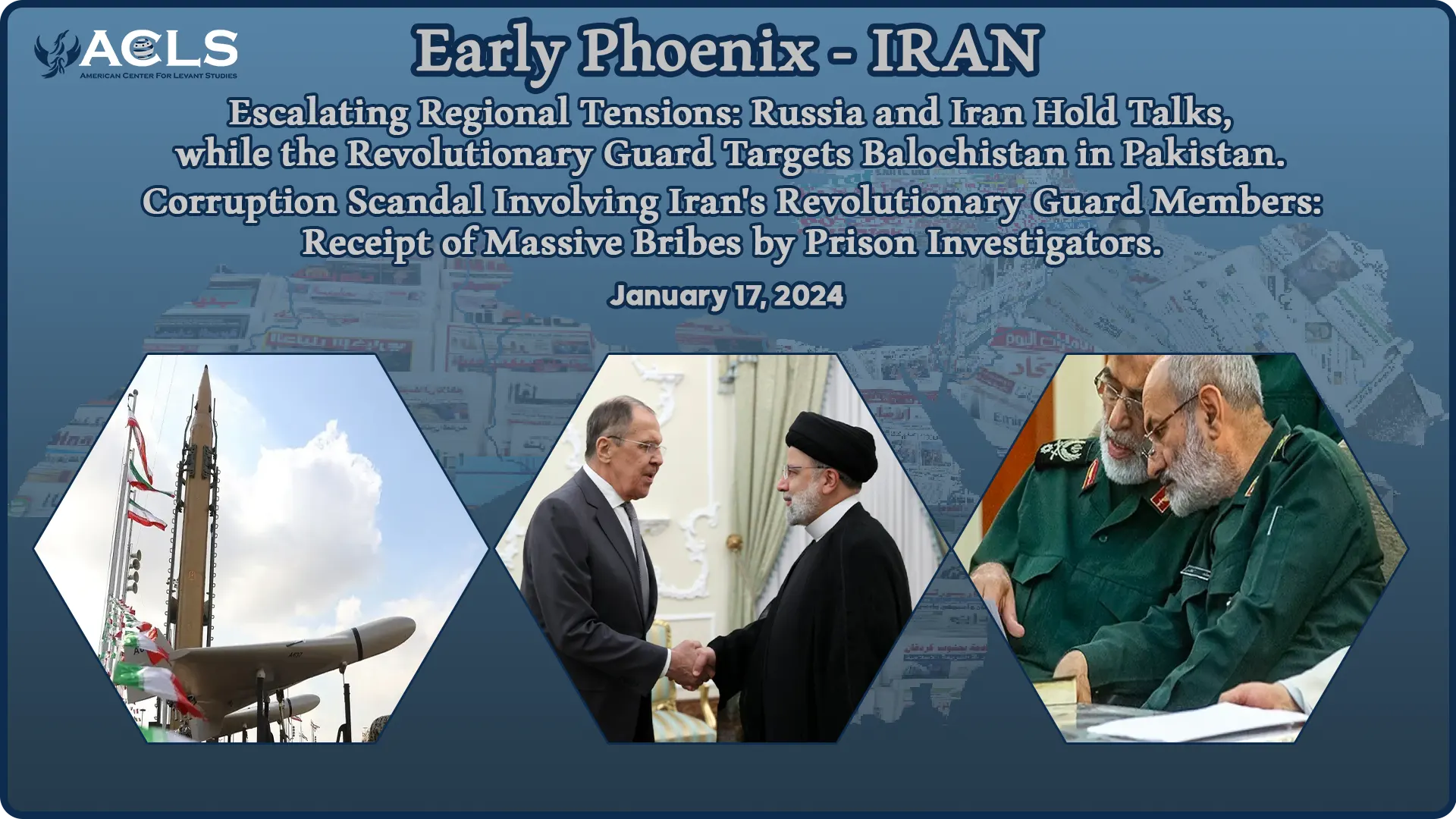
10.Escalating Regional Tensions: Russia and Iran Hold Talks, while the Revolutionary Guard Targets Baluchistan in Pakistan.
In a development that signals increased regional tensions, the Iranian Revolutionary Guard launched a missile attack targeting camps of the Balochistan Liberation Army in Pakistan. The attack has led to protests by Baloch opposition and damage to several residential homes, sparking widespread anger in Pakistan. The Pakistani government reacted with strong condemnation to the Iranian violation of its airspace, and demonstrations in front of the Iranian Foreign Ministry have further escalated tensions. The attack raises concerns about the worsening tension in the region, particularly following previous attacks on police centers in both Iranian and Pakistani Balochistan. During those rapidly evolving regional developments, Russian foreign and defense ministers held phone talks with their Iranian counterparts, covering a range of topics, including developments in Yemen. Despite their cooperation, tensions have emerged due to Moscow’s shifting positions in the Middle East. Both countries emphasized mutual respect and territorial integrity, reaffirming their commitment to the core principles of their bilateral relationship.
11. Corruption Scandal Involving Iran’s Revolutionary Guard Members: Receipt of Massive Bribes by Prison Investigators.
Iran International exposes a major corruption scandal in Iran, where prison investigators affiliated with Iran’s Revolutionary Guard received substantial bribes. Documents uncovered in the corruption scandal indicate that the massive bribes paid to prison investigators within the Revolutionary Guard’s intelligence organization were likely intended to influence the outcomes of investigations into major corruption cases or to evade sanctions and trials. Court documents reveal the involvement of seven members of the organization, including Mohammad Mehdi Badi, the organization’s deputy investigator, who accepted significant financial sums from several individuals. Among those implicated are also Ismail Khalilzadeh, the former president of Esteghlal Tehran Football Club, and Hadi Darwishvand, the owner of the Kermanshah Refinery, highlighting the involvement of individuals connected to the regime and the industry in the corruption network.
=======================
★ The Arabian Gulf

12. Saudi Arabia’s Leap into the Future: The Prince Mohammed bin Salman Stadium Ushers in an Era of Joy and Progress.
Saudi Arabia Launches Landmark Prince Mohammed bin Salman Stadium in Qiddiya, Signaling Economic Diversification. In a bold move signaling a commitment to economic development and innovation, Saudi Arabia has unveiled the Prince Mohammed bin Salman Stadium in Qiddiya, a futuristic project designed by the global firm Populous. Situated atop the Tuwaiq Mountain, the stadium features an innovative design with a retractable roof and LED walls, allowing for a diverse range of events. Equipped with advanced climate control technologies and an under-stadium cooling lake, the stadium aligns with LEED standards for sustainable design. This aligns with Saudi Arabia’s Vision 2030, aimed at diversifying income sources and creating job opportunities. Qiddiya city itself, aspiring to be a global leader in entertainment, sports, and culture, is set to enhance Riyadh’s economy and improve quality of life. Located 40 minutes from downtown Riyadh, the city will house 60,000 buildings and provide 325,000 job opportunities, contributing to an increase in the GDP by 135 billion Saudi Riyals and anticipating 48 million visits annually. The project reflects the Kingdom’s vision of moving away from oil dependency towards a diversified and sustainable economy, focusing on investing in entertainment and cultural infrastructure. This move showcases Saudi Arabia’s pursuit of stability and growth amidst regional tensions.
In the international arena, Saudi ministers attending the Davos conference expressed the urgency of an immediate ceasefire and growing concerns over risks in the Red Sea, highlighting the need to address the root causes of such conflicts, in a nod to Iran. Additionally, Saudi Foreign Minister Prince Faisal bin Farhan met with his Qatari counterpart Sheikh Mohammed bin Abdulrahman in Davos to discuss enhancing bilateral relations and the latest developments in Gaza.
=======================
★ EGYPT
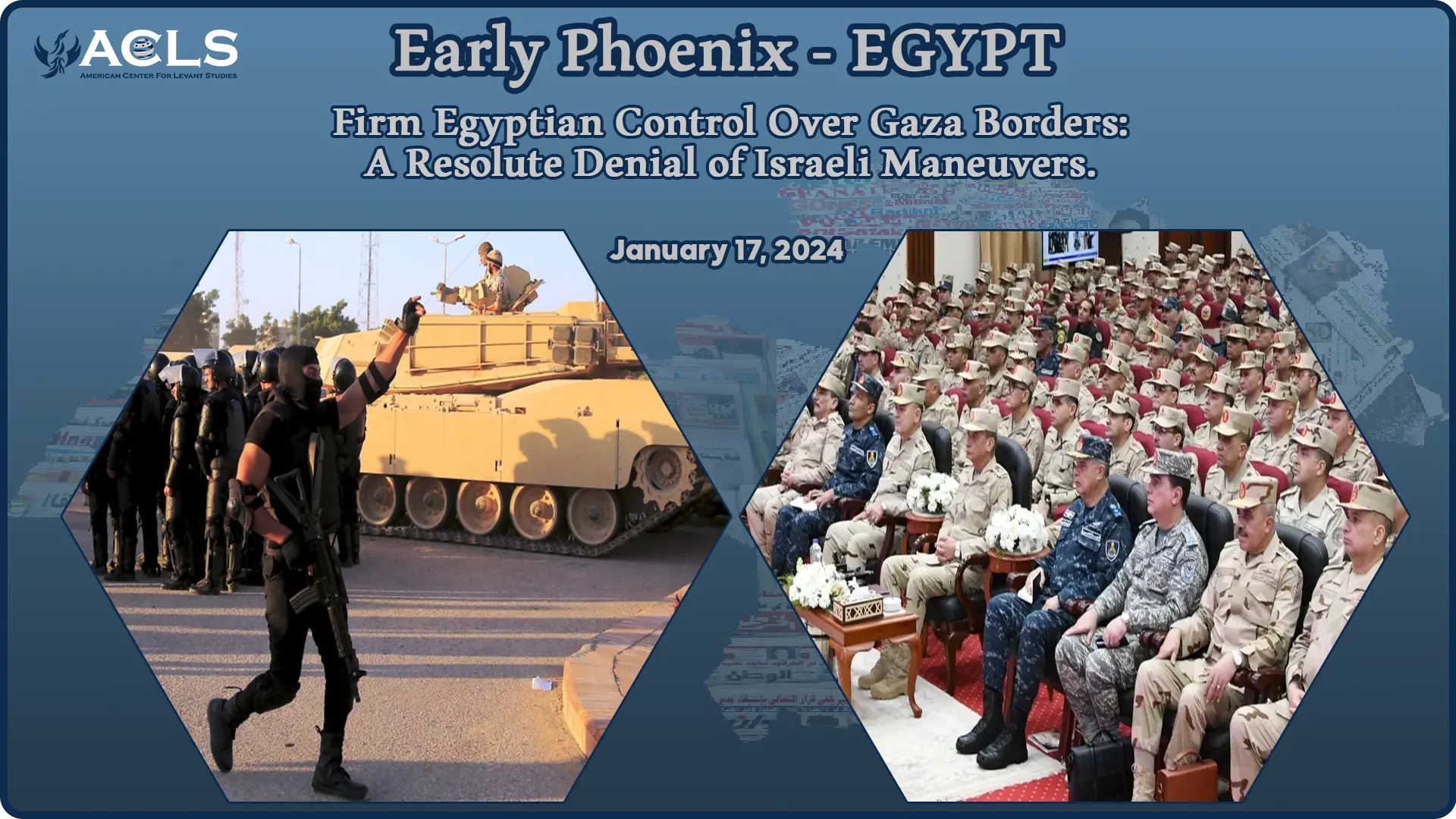
13. Firm Egyptian Control Over Gaza Borders: A Resolute Denial of Israeli Maneuvers.
An Egyptian security source today firmly denied the possibility of Israeli control over the Philadelphia Corridor, which lies within the Gaza Strip on its borders. The source stated categorically that Egypt will not allow Israel to gain control over the Philadelphia Corridor under any pretext. He clarified that the peace agreement prohibits Israel from conducting any military movements in this corridor, affirming Egypt’s continued full control over its border with Gaza. The source also dismissed Israeli claims about arms smuggling across the Egyptian-Gaza border, labeling them as baseless rumors. He emphasized that Egyptian authorities strictly regulate the entry of aid into Gaza, in accordance with the mechanisms agreed upon with Israel and the United States.
In a related development, Egypt’s Minister of Defense, General Mohamed Zaki, convened a meeting with the leaders of the armed forces following escalating tensions on the border with Israel. The meeting focused on enhancing military performance and bolstering Egyptian national security, with a particular emphasis on combat efficiency and the high readiness of the forces. This meeting followed the Egyptian army’s successful thwarting of an attempt to smuggle a large quantity of drugs, estimated at 174 kilograms, near the Al-Ouja outlet in a region known for inspecting aid bound for Gaza. The operation resulted in one fatality and the arrest of six smugglers. This incident, which involved an exchange of gunfire, led to injuries among the Israeli army personnel, marking a rare occurrence on the Egyptian-Israeli border.



